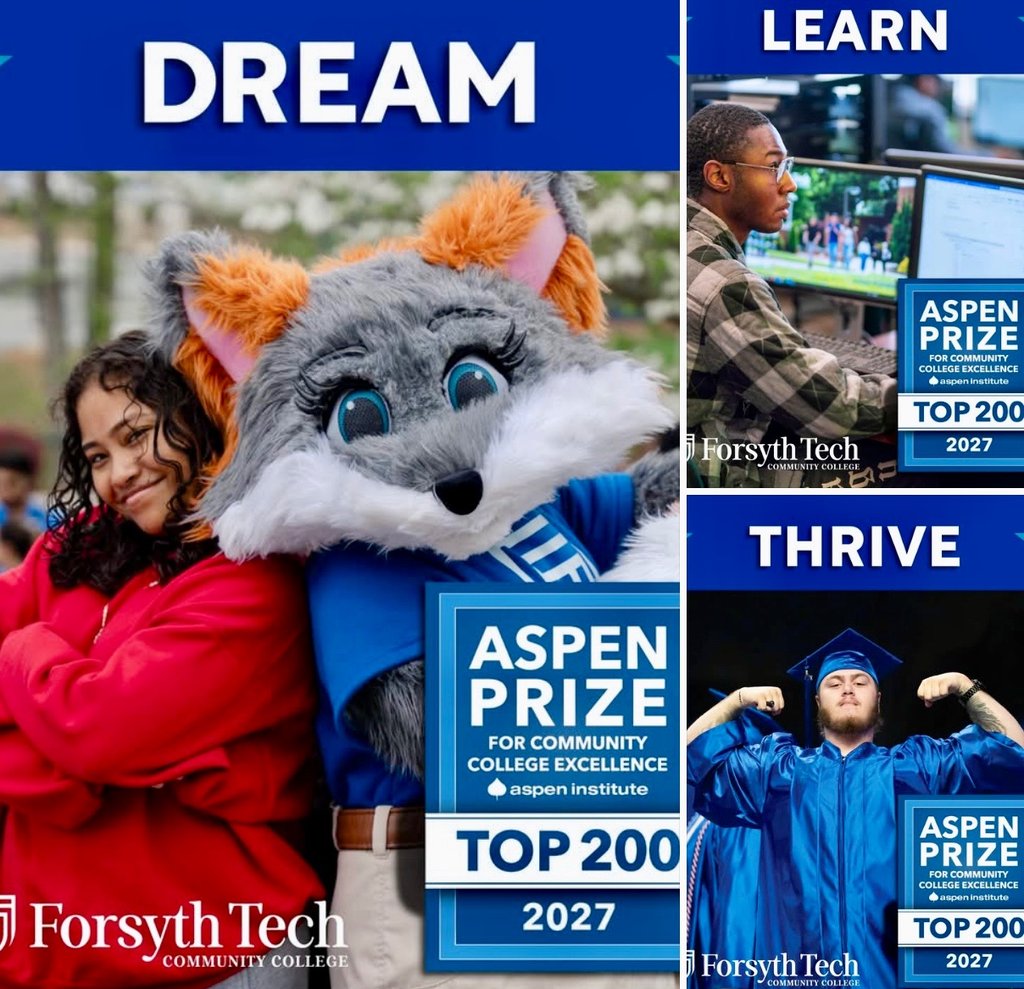Advancing Student Success in an Ecosystem of Curiosity, Courage, and Care
Forsyth Tech’s whole college transformation story: how a graduation rate that doubled from 21% to 43%, enrollment that reached its highest point in over a decade, and a commitment to putting students first changed everything. Discover how building intentional, proactive, and relational structures—grounded in curiosity, courage, and care—created breakthrough results and launched Vision 2030: Future-Ready by Design with a new North Star: Dream, Learn, Thrive.
Janet N. Spriggs, Ed.D.
11/4/20255 min read


In 2020, despite the dedicated work of our faculty and staff, our three-year graduation rate was 21 percent. This metric had little to do with effort and everything to do with institutional structures built for a different time. Our systems, policies, and structures had not evolved to meet the complex needs of today’s students.
The Challenge
In 2019, as we built our Vision 2025 strategic plan, we began with an honest assessment of where we were. Our three-year graduation rate was well below the national average for two-year public community colleges. Enrollment was declining. Significant numbers of students were falling through gaps we had not even realized existed. Too many policies were reactive rather than responsive while too many processes lacked human connection and interventions.
We could have blamed external forces, but instead, we chose to “challenge the status quo” and fundamentally reimagine what a community college could be.
We chose transformation.
A Theory of Change
Vision 2025 was built around a straightforward insight: student success requires intentional design, proactive support, and relational structures. Rather than waiting for students to find help when they have an urgent need, we needed to build proactive systems that connected students with support throughout their journey, before they found themselves facing a crisis. We had to intentionally work across college divisions rather than in silos. We needed to get to know our students as people and build relationships instead of focusing on interactions with students as customer transactions.
Additionally, along with intentionality, proactivity, and relationships, our theory of change was that we needed to build a culture and educational ecosystem framed by curiosity, courage, and care. Curiosity to assess our data with clear eyes, ask hard questions, and own the data. Courage to be comfortable being uncomfortable and acknowledge when student success data metrics were unacceptable. And care, meaning we made the deliberate decision to care deeply and genuinely for each and every person who walks through our doors.
That commitment led us to transform three critical areas:
Academic Pathways That Make Sense
We looked at our programs through our students’ eyes and did not always like what we saw. We found confusing prerequisites, courses offered only once a year, and pathways that zigged and zagged without clear direction. So, we simplified. We redesigned programs into flexible eight-week terms that let students accelerate or pause without losing momentum. We built career exploration, so students were not just taking classes, they were building toward specific, employer-validated skills.
That work ws not easy and the resistance was real. Some people worried we were sacrificing rigor for speed, but when we examined which students were succeeding and which were struggling under our old structures, the conversation shifted from “should we change?” to “how fast can we change?”
As we redesigned programs and support services, we intentionally asked: Does this serve student success, or does it serve our convenience?Wraparound Support That Removes Barriers
We created Forsyth Tech Cares, an award-winning network that treats students as whole people, not just enrollment numbers. Through privately donated money from our Foundation and external community parters, we provide support like: emergency aid when a car breaks down, food assistance when the choice is between textbooks and groceries, childcare support so parents can actually attend class, or help finding secure housing when “home” is not stable.We also expanded mental health counseling because academic success and personal wellbeing are inseparable, and we kept our doors open when students actually needed us, providing year-round enrollment support, extended hours during peak registration periods, and technology and AI-assisted 24/7 support to meet students where they are whenever they needed us.
Being proactive meant we did not wait for students to ask for help, we built outreach systems that identified needs early and connected students to resources before small problems became insurmountable crises. Being relational meant that students were not just id numbers, they had people who knew their names, understood their circumstances, and championed their success.Employer Partnerships That Guarantee Outcomes
Economic mobility is not just about earning a degree; it is about earning a living. We built deep relationships with regional employers, inviting them to help shape our curricula. We expanded apprenticeships and work-based learning, so students graduate with both credentials and experience.Today, our graduates are not just finding jobs, they are launching careers with wages that can support families and build wealth. I loved hearing the leader of a local healthcare system tell me: “We love Forsyth Tech graduates because they show up ready on day one with the technical skills and the professional habits we need.”
The Results
This fall, more than 9,900 curriculum students are enrolled at Forsyth Tech and in total this year, we will serve around 22,000 curriculum, short-term workforce, basic skills, or personal enrichment students across Stokes and Forsyth counties and beyond. This is our largest headcount since 2013. More importantly, students are not just enrolling, they are completing. Our three-year graduation rate has more than doubled, soaring to 43 percent. Students from all backgrounds are succeeding at rates we once thought impossible, with underrepresented minority students graduating at 42 percent.
But the numbers only tell part of the story. The real success stories are people stories: students who are the first in their families to earn a college credential, workers who pivoted from declining industries into high-demand, family-sustaining wage careers, and strengthened communities because when our students succeed, our entire region benefits. Greater economic mobility means fewer people living in poverty and skilled workers to meet industry workforce talent needs and expanded economic opportunity for all.
What Made It Possible
This work demanded whole college transformation and breaking down inter-divisional silos. Today, enrollment services and advising coordinate with academic divisions, faculty collaborate with student support staff, Information Technology systems serve student needs. We stopped thinking in departments and started thinking in student journeys.
Our ecosystem of curiosity, courage, and care became our brand — #APlaceofPromise — but that was never just a tagline. Being a place of promise for every student became the filter for every decision. When we were curious about why completion rates differed across programs, we uncovered hidden barriers. When we had the courage to eliminate those barriers, we redesigned processes that had existed for decades. And when we centered care in every interaction, we built trust with students who had been let down by too many systems before.
What’s Next
Vision 2025 proved that when you build intentional, proactive, and relational structures grounded in curiosity, courage, and care, extraordinary results follow. But we are not declaring victory because we still have students who are depending on us to keep this movement going.
We are asking new questions: How do we sustain and scale? What emerging workforce needs should shape our next program investments? How do we deepen our partnerships to create even clearer career pathways?
As this year comes to a close, we are also closing Vision 2025 and and launching our new strategic framework: Vision 2030: Future-Ready by Design. Our new North Star: Dream, Learn, Thrive, captures both our aspiration and our promise that every student who walks through our doors will have the space to dream boldly, the support to learn deeply, and the foundation to thrive long after they leave us.
Because at Forsyth Tech, this is our new vision: Forsyth Tech ensures everyone, no matter where they start, can rise, thrive, and lead.
